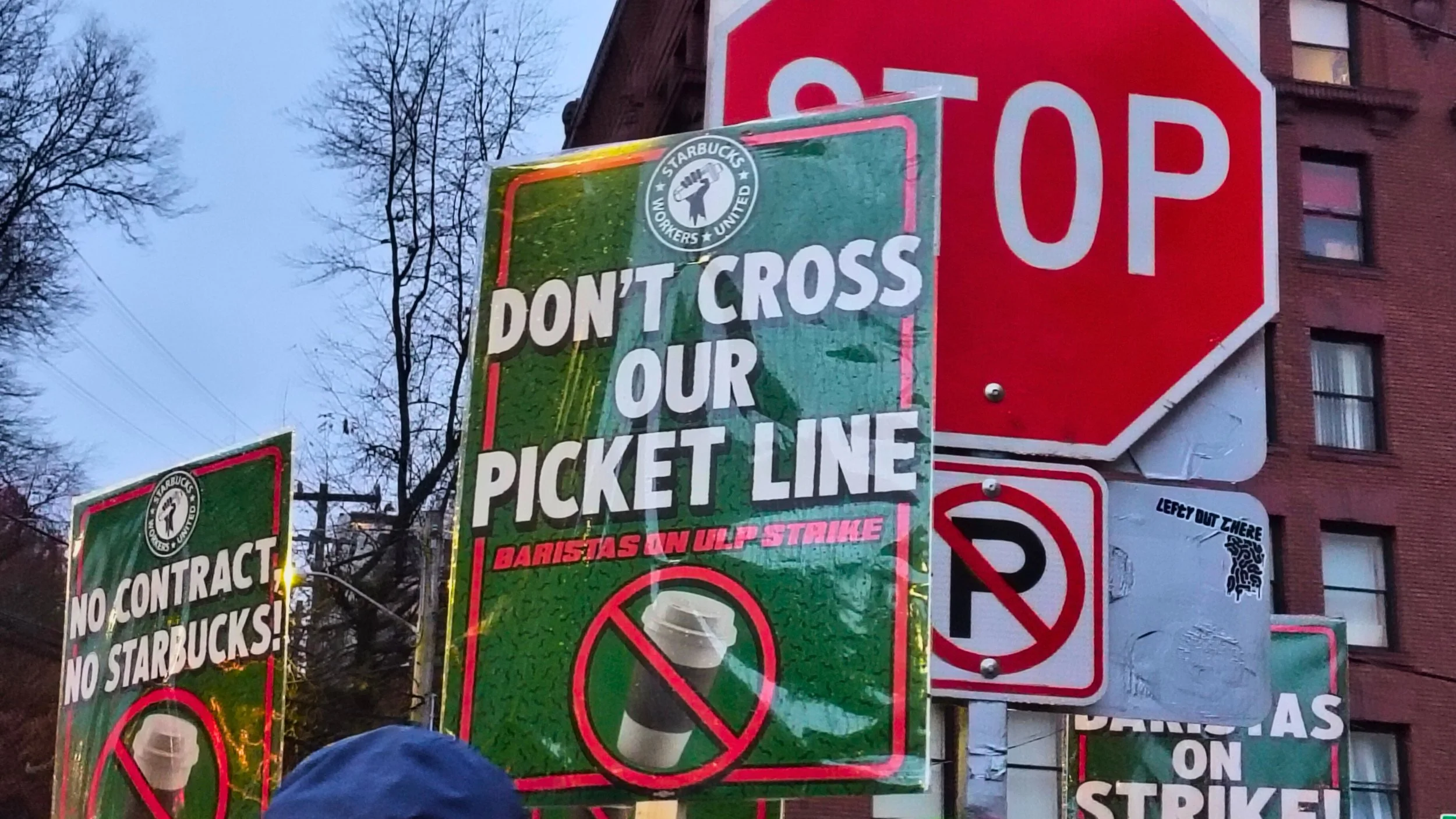SBWU Strike! Red Cup Rebellion Joined by Rep. Scott, Mayor Wilson
Banner reads “No Contract, No Coffee” at SBWU rally
The Evergreen Echo
Seattle is known for many things: it’s a port town, a big tech hub, and a city surrounded by the majesty of nature. It’s also notorious for its unions and coffee culture. Our multi-faceted rainy city is the birthplace of Starbucks and the site of the only successful general strike in the history of the United States of America. When workers chant, “Seattle is a union town,” there’s ample history to back it up. The struggle of workers against corporate greed continues as the Starbucks Workers’ United (SBWU) launched a nationwide strike on November 13, re-christening the pro-profit “Red Cup Season” into a pro-labor “Red Cup Rebellion.”
The strike comes in response to years of unsuccessful bargaining sessions in which Starbucks dismissed their workers’ concerns, chief among them proper staffing and increased wages. A key issue in this strike is Starbucks’ liberal use of union-busting tactics. SBWU has filed over one thousand ULPs (unfair labor practice suits), citing hundreds of unresolved labor law violations such as retaliatory firings, withholding tips, store closures, and unfair staffing cuts.
It is only natural that Starbucks Workers United (SBWU), though originally founded in Buffalo, NY, in 2021, gained significant traction in Seattle, given the city’s progressive-leaning population and the skyrocketing cost of living. Despite Starbucks’ strong roots in the city, the corporation closed multiple locations over the last few years, most recently the two iconic Starbucks Reserve locations in Capitol Hill and SoDo. These setbacks have not deterred the SBWU unions in Seattle. On November 13, as part of a nationwide day of action, Seattle Starbucks workers, other unions, and community members formed a picket line in front of the shuttered Pike / Pine Roastery location.
The rally was high energy despite the dreary Seattle weather—in fact, organizers came prepared for the long haul, with their “No Contract, No Coffee!” signs wrapped in clear plastic to protect their message from the rain. Allied groups provided tents, lights, live music, and a robust sound system to raise the spirits of the crowd. Passing cars honked in solidarity. The demographic of attendees reflected the diverse fabric of Seattle: BIPOC, queer folks, blue collar workers, disabled workers, and the young and the old. Let it not be said that Seattle leftist movements depend on “privileged white upstarts.”
People hold up signs messaging the SBWU strike
The Evergreen Echo
Speakers included both current and former Starbucks workers, organizers from SEIU, and elected figures such as Washington State representatives Shaun Scott and Nicole Macri. Seattle’s new mayor-elect Katie Wilson proved dedicated to her pro-labor platform and joined the rally just hours after her victory lap at the Seattle Labor Temple. All the speakers related the same key message: Starbucks workers will not back down until they win an equitable contract.
“Baristas are the heart and soul of this company, and they deserve better than empty promises and corporate union-busting,” said Wilson. “I am proud to say loud and clear, I am not buying Starbucks, and you should not either.”
In nearly every speech, speakers denounced the bloated salary of Starbucks’ new CEO Brian Niccol, who is set to be paid about $96 million after just four months in his role. Baristas shared their experiences, depicting the stark contrast between the daily struggles of working hand-to-mouth and Niccol’s comfortable executive position. In their own words, they spoke about the reality shared by Starbucks baristas across the country: How their wages did not increase to keep pace with the cost of living; how the company withheld credit card tips specifically from unionized stores; and how Starbucks have repeatedly closed locations that participated in strikes.
Shaun Scott, a Washington State representative who joined previous picket lines in support of SBWU, said solemnly, “You can’t have a society without working people.” He condemned Starbucks alongside other major corporations for attempting to brand the National Labor Relations Board unconstitutional. “In this district—which sent a socialist to City Hall for a decade, which sent me to state legislature as the first open socialist to represent any district in Washington state in over 110 years, and in a city that just elected a socialist mayor—that kind of conduct is unacceptable, and that’s why we’re taking to the streets.”
Emma Cox, a Starbucks union member from the University District, came armed with numbers. “We all know this company can afford to give us a contract…As a union we estimate [the contract] would only cost the company around 75 million dollars. That’s one day of profit.” Cox continued, “I should not be struggling to pay rent in the city that I live in and work in.”
When asked how the Seattle community at large can best support baristas while they’re on strike (other than the should-be-obvious “Never Cross a Picket Line”), Emma Cox said, “Definitely sign the No Contract, No Coffee Pledge.” Next, tell your friends, and when you have a moment, join a picket line at the Pike / Pine Roastery.
Cox added that they are running a kitchen and pantry for striking workers. “If you have non-perishables that you want to donate, just drop them off at a picket line, and we’ll disperse it all to workers. It’s not sustainable if no one’s being fed.”
Fittingly in green and red typical for Starbucks advertising this time of year, SBWU posters cover the former Roastery façade.
The Evergreen Echo



